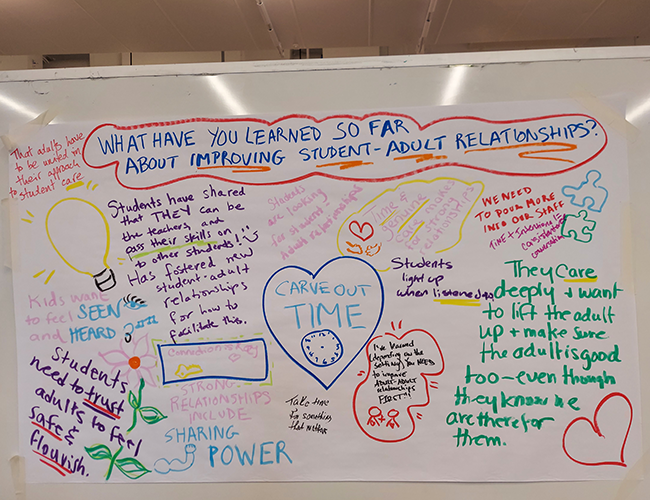Blog
Partner Spotlight: SSN’s Bold Work to Strengthen Student-Adult Relationships
What happens when you treat relationships as more than a soft skill—and instead as a foundation for real, measurable change?
Over the past year, the Student Success Network (SSN) in New York City answered that question by convening six transfer high schools and their community-based organization (CBO) partners in a hands-on, research-informed learning cohort: the Improvement Lab on Student-Adult Relationships.
Rooted in Search Institute’s Developmental Relationships Framework, the lab supports school and CBO teams in strengthening connections between students and adults not through one-off programs, but by testing, refining, and embedding relationship-building strategies into school culture.
Why Relationships?
NYC Transfer High Schools serve students aged 16 to 21 who are significantly behind in credits and need to earn a high school diploma, including those who have dropped out or are off-track for graduation. Students often are navigating systemic barriers and school experiences that leave them feeling unseen or unsupported. SSN and and their improvement lab members knew that these students didn’t need another program. They needed people who showed up for them, challenged them, shared power with them, and opened doors to new possibilities.
Search Institute’s Developmental Relationships framework provided a shared language and actionable structure for what high-quality relationships actually look like: expressing care, challenging growth, providing support, sharing power, and expanding possibilities.
From Theory to Practice
Participating schools and partners, including Judith S. Kaye High School, Urban Dove, Bronx Arena, and West Brooklyn Community High School, used continuous improvement strategies to identify relational challenges and test innovative solutions.
Here’s a glimpse of what that looked like in action:
- Urban Dove Bronx piloted the 2x10 strategy engaging targeted students in two minutes of personal conversation for ten consecutive days. Staff noticed improved relationships, easier conflict de-escalation, and greater student engagement.
- Judith S. Kaye Queens paired students with teachers to co-lead community-building projects, deepening trust and empowering youth to take the lead.
- West Brooklyn created "baseball cards" with key student insights to help staff personalize interactions. Students began advocating for themselves more and spending unstructured time in classrooms—a sign of growing trust.
These weren’t just feel-good stories, they were measurable shifts. Schools used Search Institute’s Developmental Relationships Survey as a diagnostic assessment, helping SSN to identify areas of focus. Teams collected practical data along the way to monitor their work—this included feedback from staff and students, as well as quantitative data to assess progress, revealing significant growth in connection and collaboration.
But the partnership didn’t stop at providing a framework and survey tool. The Search Institute team worked alongside SSN and their school partners to interpret findings, connect them to the research base, and translate insights into strategies for daily practice. By co-creating meaning and application together, the framework became more than theory. It became the foundation for a shared vision of relational work across schools and community-based organizations.
Lessons That Transcend Schools
The Improvement Lab surfaced powerful insights that apply far beyond NYC:
- Listening is a skill and students notice when adults make space for their voices.
- Staff need support, too as relationship-building takes time, structure, and emotional labor.
- Relationship work is system work. To sustain impact, schools must prioritize it with time, training, and shared commitment.
A Shared Vision
SSN's work exemplifies what it means to move from transactional programming to transformational ecosystems. Together with Search Institute, they’re showing that students thrive when schools and CBOs invest in relationships and treat connection as strategy, not sentiment.
Explore SSN’s Improvement Lab Highlights.





